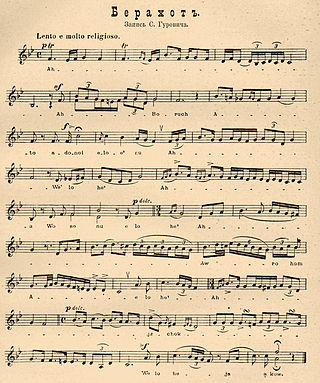The First Commandment of the Ten Commandments may refer to:

Shema Yisrael is a Jewish prayer that serves as a centerpiece of the morning and evening Jewish prayer services. Its first verse encapsulates the monotheistic essence of Judaism: "Hear, O Israel: YHWH is our God, YHWH is one", found in Deuteronomy 6:4.

The Amidah, also called the Shemoneh Esreh, is the central prayer of the Jewish liturgy. Observant Jews recite the Amidah at each of three daily prayer services in a typical weekday: morning (Shacharit), afternoon (Mincha), and evening (Ma'ariv). On Shabbat, Rosh Chodesh, and Jewish festivals, a fourth Amidah (Mussaf) is recited after the morning Torah reading, and once per year a fifth Amidah (Ne'ilah) is recited, around sunset on Yom Kippur. Due to the importance of the Amidah, in rabbinic literature it is simply called "hatefila". According to legend, the prayer was composed by the rabbis of the Anshei Knesset HaGedolah. Accordingly, in Judaism, to recite the Amidah is a mitzvah de-rabbanan, i.e., a commandment of rabbinic origin.
In its primary meaning, the Hebrew word mitzvah refers to a commandment commanded by God to be performed as a religious duty. Jewish law in large part consists of discussion of these commandments. According to religious tradition, there are 613 such commandments.

Rabbinic authority in Judaism relates to the theological and communal authority attributed to rabbis and their pronouncements in matters of Jewish law. The extent of rabbinic authority differs by various Jewish groups and denominations throughout history.

The Ten Commandments, or the Decalogue, are a set of biblical principles relating to ethics and worship that play a fundamental role in Judaism, Christianity, and Islam. The text of the Ten Commandments appears twice in the Bible: at Exodus 20:2–17 and Deuteronomy 5:6–21.
The Great Commandment is a name used in the New Testament to describe the first of two commandments cited by Jesus in Matthew 22:35–40, Mark 12:28–34, and in answer to him in Luke 10:27a:
... and one of them, a lawyer, asked him a question to test him. "Teacher, which commandment in the law is the greatest?" He [Jesus] said to him, "'You shall love the Lord your God with all your heart, and with all your soul, and with all your mind.' This is the greatest and first commandment. And the second is like it: 'You shall love your neighbor as yourself.' On these two commandments hang all the law and the prophets."
Love Thy Neighbor or Love Thy Neighbour refers to the Biblical phrase "thou shalt love thy neighbor as thyself" from the Book of Leviticus 19:18 in the Hebrew Bible about the ethic of reciprocity known as the Golden Rule or the Great Commandment.
Although rare, there are instances within Jewish law that mandate a Jew to sacrifice their own life rather than violate a religious prohibition. One of these prohibitions is that no life should be taken, including one's own. Many more ritual prohibitions exist as well, which means that under limited circumstances a Jew has to self-sacrifice when the greater good calls for breaking a more minor dictate. This practice reflects the practical and perhaps malleable nature of Judaic law.
The Second Commandment refers to and deals with the way Abrahamic worshippers of the true God worship. The second commandment's most obvious aspect governs the use of physical "helps" or "aids" in worshipping the invisible, spiritual God.
The Third Commandment of the Ten Commandments could refer to:

"Honour thy father and thy mother" is one of the Ten Commandments in the Hebrew Bible. The commandment is generally regarded in Protestant and Jewish sources as the fifth in both the list in Exodus 20:1–21 and in Deuteronomy (Dvarim) 5:1–23. Catholics and Lutherans count this as the fourth.

"Thou shalt not take the name of the LORD thy God in vain" is the second or third of God's Ten Commandments to man in Judaism and Christianity.

Thou shalt not kill, You shall not murder or You shall not murder (NIV), is a moral imperative included as one of the Ten Commandments in the Torah.
The Fourth Commandment of the Ten Commandments may refer to:
The Sixth Commandment of the Ten Commandments could refer to:
The Seventh Commandment of the Ten Commandments could refer to:
The Eighth Commandment of the Ten Commandments may refer to:
The Ninth Commandment of the Ten Commandments could refer to:
This page is based on this
Wikipedia article Text is available under the
CC BY-SA 4.0 license; additional terms may apply.
Images, videos and audio are available under their respective licenses.



